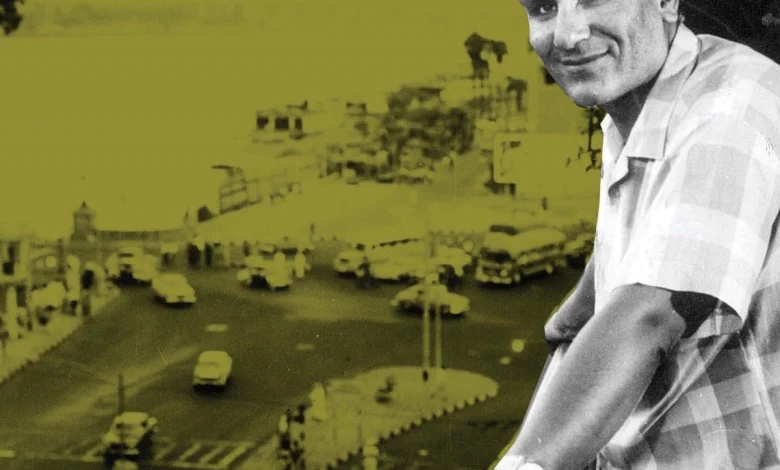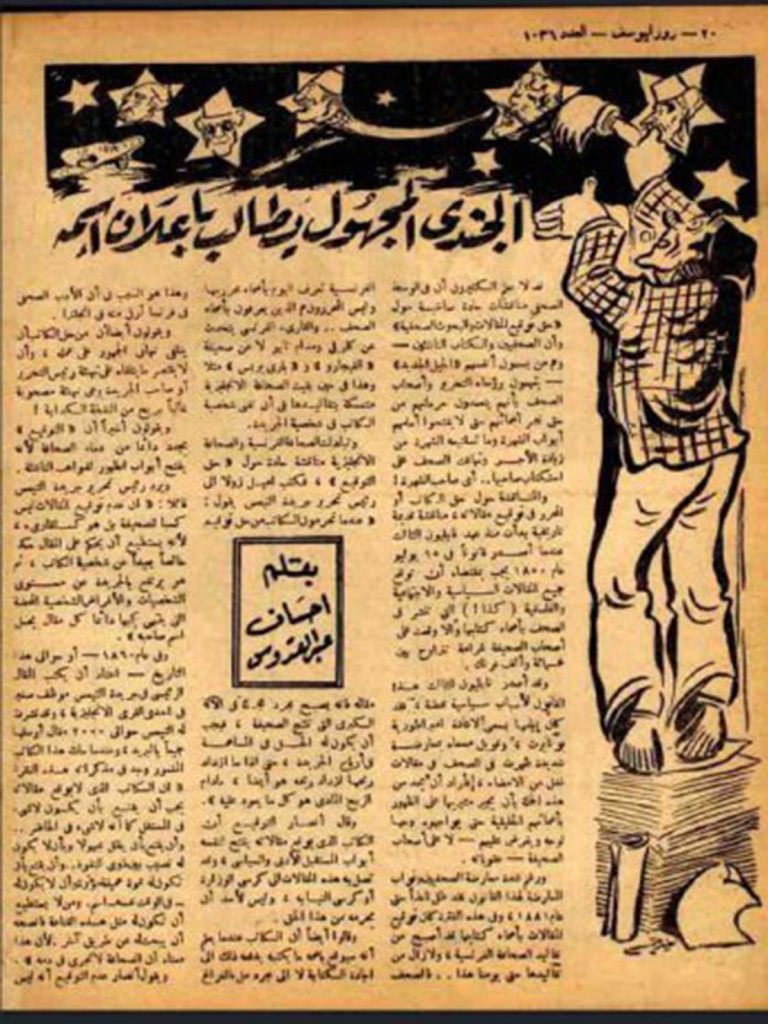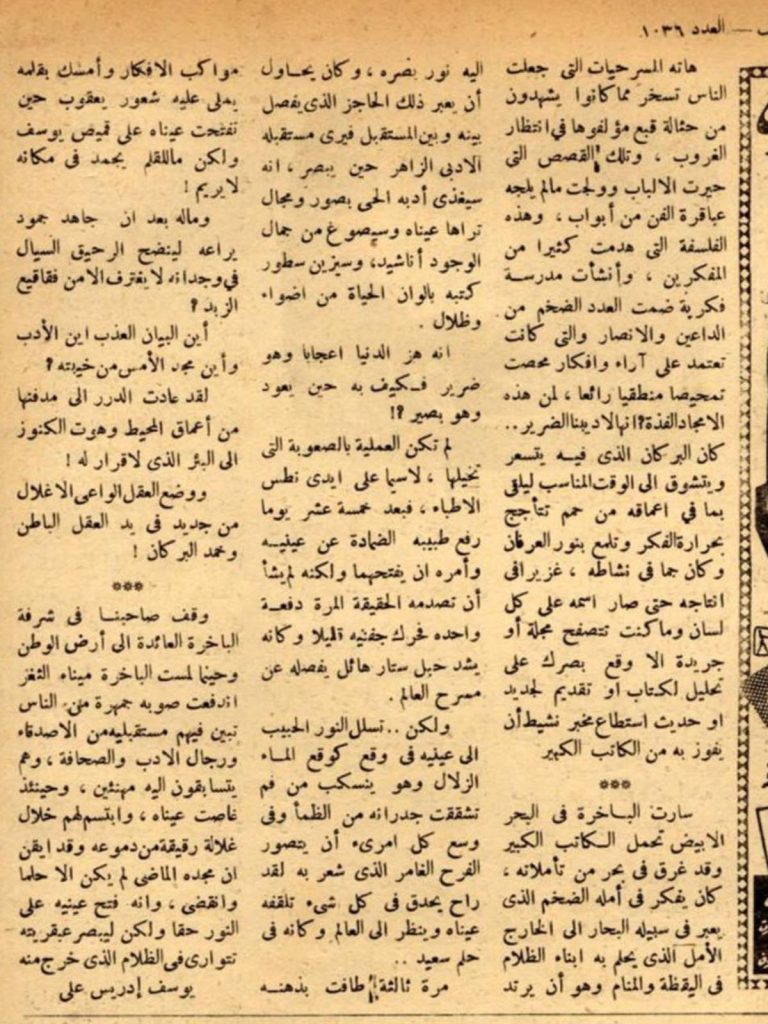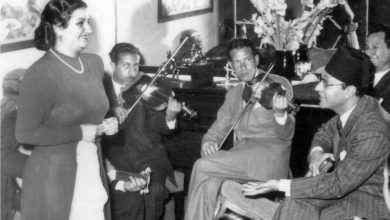
“Light of Darkness”: The Story That Launched Youssef Idris’s Literary Career
Youssef Idris lived a life filled with noise and commotion, filling the world and occupying people for decades with his bold, revolutionary ideas and his unrelenting emotions. Although these numerous battles undoubtedly hurt his outstanding literary production, they revealed his other side as a critic. It is no surprise that Youssef Idris wrote an important article in the newspaper Al-Jumhuriya in 1967 entitled: “The writer’s job is to criticise.”
For decades, critics continued to follow Idris’s work and his critical opinions on the issues of his time, which he often clashed over. Literary historians and critics agree that the first short story written by Youssef Idris was “Anshuda al-Gharib” (The Song of Strangers), which was published in Al-Qissa magazine in March 1950.
Strangely, in 1977, Al-Hilal magazine published a special issue on the art of the short story. It included Idris’s story “The Curse of the Mountain,” which had been published in Rosalyoussef magazine in April 1950, as his first story. When the magazine’s editor asked Idris about the fee he received for his first work, Idris replied, “The fee was the publication itself.” At that time, publication in major literary magazines was a birth certificate and a ticket to fame for novice writers.
Light in the Darkness in Rosalyoussef in 1948
But the surprise lies in the fact that Youssef Idris, who signed his work as “Youssef Idris Ali” in his early days, published a short story entitled “Light in the Darkness” in Rose al-Youssef magazine on April 21, 1948, covering two full pages. This story thus became Idris’s first piece of writing. It was also perhaps the first appearance of his name in the Egyptian press, two full years before “Anshuda al-Gharba’a” (Song of Strangers), when he was a medical student not yet 21 years old.
It is a striking irony that the issue that published “Light in the Darkness” also contained an article by Ihsan Abdel Quddous, the magazine’s editor-in-chief at the time, entitled “The Unknown Soldier Demands His Name Be Revealed.” By “unknown soldier,” he meant emerging writers, defending their right to sign their works, after years of opposition by some newspapers to printing the names of new writers on their productions.
He concluded his article by writing: “If newspaper owners find an emerging writer who shows promise for the future, they do not have the right to prevent him from signing his name or receiving payment, but they do have the right to sign a long-term contract with him so that they can benefit from him for a sufficient period of time. This is to compensate them for the opportunity they gave him to achieve fame.”

The promising young man’s future
It was as if Ihsan could see the future, the promising future of the young man Youssef Idris Ali, who published his first story in the same issue. Thus, Rosalyoussef was the first incubator for Youssef Idris’s creativity. He published “Nour al-Zalam” (Light of Darkness) in 1948, and two years later, he returned to publish “La’nat al-Jabal” (The Curse of the Mountain). The publications continued until Mrs Fatima Al-Youssef published his first collection of short stories, “The Cheapest Nights,” in the Golden Book series in 1954.
Idris later became the supervisor of the magazine’s literature section, and in turn embraced many young writers and presented them with a generous spirit. He even complained on behalf of young writers about the lack of publishing opportunities, trying to publish as many of them as possible. In March 1965, he wrote an article in Al-Jumhuriya newspaper entitled “A Wealth of Stories,” in which he said:
“The problem that puzzles me now is what to do with this modest wealth of short stories that I have written, a huge mass, which has ended up in a drawer in my office. To date, there are over a hundred stories, most of them, if not all, by writers who have never published a single word before… Names that may not stick in the mind. But I testify that their work is, in my opinion, equal to, if not greater than, that of famous writers with illustrious names.”
In his article, Idris discussed the work of the promising young Jamal Ahmad al-Ghitani and Yahya al-Tahir Abdullah. Idris had first introduced Yahya al-Tahir in Al-Kuttab magazine. He mentioned his brother Ahmed Idris, who wrote many stories but kept them with him for reading only. He emphasized his outstanding talent for storytelling, which, if collected in a book, would be a wonderful showcase of sincere and fresh work.
The story “Light of Darkness”
The story is about a man who loves reading and has a bookshop where he sells books, but he reads more than he sells. He tries to move from reading to creative writing, but finds something preventing the words from flowing onto the paper. Youssef Idris interprets this as a conflict between his subconscious and conscious mind. The conscious mind restrains the thoughts of the subconscious and paralyses its movement. When the protagonist of the story goes blind, his conscious mind is set free, his imprisoned genius is unleashed, and he becomes a famous writer. When his sight returns, the flame of creativity is extinguished, as if the darkness in which the protagonist lived was the light that unleashed his talent and creativity.
After publishing this story in April 1948, Youssef Idris stopped publishing for two whole years, until he returned in 1950 with “Anshuda al-Ghuraba” (The Song of Strangers) and then “La’nat al-Jabal” (The Curse of the Mountain). Perhaps what happened to him was similar to what happened to the protagonist of his story, where his imprisoned genius was restrained by his conscious mind and paralyzed, so he waited until his subconscious mind triumphed, as happened in his story.
Here is the text of the story, which has not been published before in any of Idris’s short story collections:
Light of Darkness
(In one of the quiet, modest neighborhoods, there was a small library, crammed with books in no particular order. Its owner was strange in his nature, unusual in his habits and traditions. He did not care whether he sold or did not sell, whether he made a profit or a loss, as long as he could retreat into one of the volumes that filled his library. He bought them to read first, and then, if he was lucky, a buyer would come along, otherwise he would cram them in with the others in his modest library.
He lived on the income from the house he had inherited from his father, so it was no surprise that his unbridled love of reading led him to make this library his center and headquarters, where he read many books: prose and poetry, science and literature. His eyes never tired of scanning the pages and lines, and his thirst was never quenched, no matter how much he drank from the secrets of the soul and the philosophy of existence.
He would read, and his thoughts would mingle with what was in the book. What was in the book would mingle with his thoughts, and from them would emerge a strange mood, the powerful effect of which he felt within himself, like the pleasure that shines in his eyes like the light on the surface of the waves.
***


He spent fifteen years in constant reading and renewed learning, until the pearls of literature and the gems of knowledge crowded his mind.
How astonished and amazed he was when he picked up his pen and tried to convey in words the procession of thoughts that his reading had inspired in his mind, only to find that the pen was frozen in place, unable to move. He might struggle with the stiffness of his pen to draw the flowing nectar from his consciousness, only to find that he could scoop up nothing but bubbles of foam. This was the source of wonder in his life. It was as if he were gathering precious gems from the pages of books and burying them deep in a bottomless pit! It was as if he were depositing his treasures in a well with no bottom. Then he would return to ask about them, but only an echo would answer him, and nothing else.
He continued to read and read, indifferent to his health and his body. He no longer knew night from day, and only lit his lamp when the words became blurred. What use was his knowledge of night and day as long as the words were illuminated before his eyes? The succession of light and darkness around him meant nothing to him.
One day, he saw small black dots dancing on the pages spread out before him, and whenever he moved his gaze to where they were, they played tricks on his eyes. The light in his eyes had dimmed in the face of the lights of the years and the lights of the lamps. But he did not care about the dark web. Its rings narrowed and narrowed, until one day he saw the world as a mass of blackness. He kept shouting like a madman: “Light, light, turn on the light!” The sun in the sky sent forth light that no longer reached his eyes. He immediately went to the doctor, leaning on his nephew’s arm. But what could medicine do when fate had already been decided? He returned, and the hammer of tragedy fell upon his head with a violent blow, echoing in the ears of his nephew who was leading him.
***
Everyone can imagine the shock and horror of a person who loses his sight after reading had been the joy of his life and the pleasure of his existence. But he found his lost eyes in his nephew. He would read and find that what he heard was completely different from what he felt when he read.
Once again, a flood of thoughts crossed his mind, and he rushed to describe to his nephew his sad feelings about losing his sight. His nephew was captivated by the torrent of magic, eloquence, and splendor that flowed from his uncle’s pen. He was impressed by the exquisite precision with which he described a person’s transition to a life of darkness and the darkness of life, in a style of refined literature.
When he repeated what he had written to his uncle, he was even more amazed and impressed by it. He stared into the darkness around him as if he could sense the source of his new inspiration. How amazing: these are his thoughts and that is his performance! Can a rock flow with water? Yes, that is what happened!
***
He was a genius, but his genius was stored in his subconscious, while his conscious mind was like a rock. He would read and focus his harvest on the seat of genius within him, undertaking to coordinate, critique, and refute with imaginative activity. But his conscious mind held back his mature ideas, preventing them from leaping forth and taking flight. Today, tragedy has paralyzed this formidable tyrant for a period of time that was sufficient for him to scatter the gems of literature and pearls of knowledge that were imprisoned within him.
People were surprised by this writer who suddenly shone, and without waiting, writers and authors were terrified of this dangerous competitor who appeared before them like a mighty genie striking with his pen in every valley they wandered in darkness. The plays that made people mock what they were witnessing were written by authors who waited for sunset. And those stories that baffled the minds and entered where even the geniuses of art could not enter, and this philosophy that destroyed many thinkers. It established an intellectual school that included a large number of advocates and supporters, which was based on opinions and ideas that were examined with remarkable logical scrutiny. To whom do these remarkable achievements belong? They belong to our blind writer.
***
He was a volcano, seething and longing for the right moment to unleash the lava that burned within him, fueled by the heat of thought and illuminated by the light of knowledge. He was prolific in his activity and prolific in his output, until his name was on everyone’s lips. Whenever you browsed a magazine or newspaper, your eyes would fall on a book review or a presentation of a new or recent work that an energetic reporter had managed to obtain from the great writer.
The ship sailed the Mediterranean, carrying the great writer, who was immersed in a sea of contemplation. He was thinking of his great hope, which was crossing the seas to the outside world. The hope that the children of darkness dream of in their waking hours and in their sleep is that the light of his sight will return to him. He was trying to cross the barrier that separated him from the future, seeing his bright literary future when he realized that he would nourish his living literature with images and fields that his eyes could see. He would compose songs from the beauty of existence and adorn the lines of his books with the colors of life, with light and shadow.
He shook the world with admiration while he was blind, so what would happen when he returned with his sight restored?
***
The operation was not as difficult as he had imagined, especially in the hands of skilled doctors. After fifteen days, his doctor removed the bandage from his eyes and ordered him to open them, but he did not want to be shocked by the bitter truth all at once. He moved his eyelids slightly, as if pulling a huge curtain separating him from the stage of the world.
But the beloved light crept into his eyes, falling like water spilling from a mouth parched with thirst. Everyone can imagine the overwhelming joy he felt. He stared at everything his eyes could see and looked at the world as if in a happy dream.
For the third time, a flood of thoughts crossed his mind, and he grabbed his pen to fill it with Jacob’s feelings when his eyes opened to Joseph’s shirt. But why did the pen freeze in place and not move? Why, after struggling with the stiffness of his pen, did it only produce the foam of bubbles?
Where was the sweet eloquence? Where was the literature? And where was the glory of yesterday’s disappointment?
***
The pearls returned to their tomb in the depths of the ocean, and the treasures fell into the bottomless well. The conscious mind once again placed the shackles in the hands of the subconscious mind, and the volcano subsided.
Our friend stood on the deck of the ship returning to his homeland. When the ship touched the port of Al-Thaghr, a crowd of people rushed towards him, among them his friends and men of literature and journalism. They raced towards him, congratulating him. At that moment, his eyes filled with tears, and he smiled at them through a thin veil of tears. He realized that his past glory was nothing but a dream that had passed, and that he had truly opened his eyes to the light. But he saw his genius fading into the darkness from which he had emerged.
Yusuf Idris Ali




